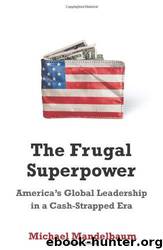The Frugal Superpower: America's Global Leadership in a Cash-Strapped Era by Michael Mandelbaum

Author:Michael Mandelbaum
Language: eng
Format: mobi, epub
Tags: International Relations, Finance, Government, Public - United States, Public Finance, Budget, General, United States, Political Science, Budget - United States, Public, Business & Economics, United States - Foreign relations - 21st century
ISBN: 9781586489168
Publisher: PublicAffairs
Published: 2010-08-10T04:00:00+00:00
CHINA
China is the obvious candidate to disrupt the twenty-first-century international order. As the most populous country on the planet and with the highest rate of economic growth, sustained over three decades, of any of the world’s almost two hundred sovereign states, its impact on international affairs is large and destined to grow larger. Indeed, by the time of the global economic disruption of 2008 China had become so important economically as to prompt suggestions that a special Sino-American forum—a “G-2”—be established to cope with the crisis.
China’s long history of cultural and political primacy in East Asia gives its people another reason to expect to play a major role in the affairs of their region and the international system as a whole. The country’s experience of decline, and with it domination, humiliation, and exploitation by foreigners in the nineteenth and twentieth centuries—the official version of Chinese history that the communist government constantly emphasizes—gives its people reason to resent existing international arrangements, which they had virtually no say in devising. China therefore has both the means and the motive to act as what students of international relations call a “revisionist power,” seeking to undermine the world’s political and economic status quo and replace it with institutions and practices more favorable to itself.
For this there is a historical precedent, and not a happy one. At the beginning of the twentieth century Germany, like China at the outset of the twenty-first, was a rapidly rising power. The Germans came to resent the distribution of power and influence among the great powers, including the way colonial territory was allocated. As a latecomer to the upper echelon of international politics, having been unified only in 1871, Germany had not been in a position to take a major part in the nineteenth-century acquisition of overseas empires by the strongest European countries. While maintaining an adversarial relationship with France, from which their army had captured the province of Alsace-Lorraine in the Franco-Prussian War of 1870–1871, the Germans drifted into opposition, as well, to Great Britain, in some ways the leading European power as the one with the largest empire and strongest navy.
The result of the Franco-German and Anglo-German rivalries was World War I, which began, according to one not entirely facetious description, because Great Britain owned the world and Germany wanted it. The growth of China’s power, its historically based aspiration for wider international prerogatives, and what some students of international politics regard as the inevitable drive by every sovereign state to maximize its own international standing at the expense of the power and privileges of other countries have combined in the twenty-first century to create the potential, if not necessarily for World War III, then at least for a robust challenge to the security of East Asia and therefore to the economically constrained guardian of stability in the region, the United States. China might, for example, seek a reduction in the American military presence or the operations of the American forces, or demand the redrawing of maritime borders, or insist on political and economic concessions from neighboring countries.
Download
The Frugal Superpower: America's Global Leadership in a Cash-Strapped Era by Michael Mandelbaum.epub
This site does not store any files on its server. We only index and link to content provided by other sites. Please contact the content providers to delete copyright contents if any and email us, we'll remove relevant links or contents immediately.
| Arms Control | Diplomacy |
| Security | Trades & Tariffs |
| Treaties | African |
| Asian | Australian & Oceanian |
| Canadian | Caribbean & Latin American |
| European | Middle Eastern |
| Russian & Former Soviet Union |
The Secret History by Donna Tartt(16623)
The Social Justice Warrior Handbook by Lisa De Pasquale(11489)
Thirteen Reasons Why by Jay Asher(7788)
This Is How You Lose Her by Junot Diaz(5772)
Weapons of Math Destruction by Cathy O'Neil(5037)
Zero to One by Peter Thiel(4824)
The Myth of the Strong Leader by Archie Brown(4789)
Promise Me, Dad by Joe Biden(4447)
Beartown by Fredrik Backman(4419)
Stone's Rules by Roger Stone(4415)
How Democracies Die by Steven Levitsky & Daniel Ziblatt(4399)
The Fire Next Time by James Baldwin(4343)
100 Deadly Skills by Clint Emerson(4078)
A Higher Loyalty: Truth, Lies, and Leadership by James Comey(4033)
Rise and Kill First by Ronen Bergman(4012)
The David Icke Guide to the Global Conspiracy (and how to end it) by David Icke(3882)
The Farm by Tom Rob Smith(3872)
Secrecy World by Jake Bernstein(3782)
The Doomsday Machine by Daniel Ellsberg(3731)
